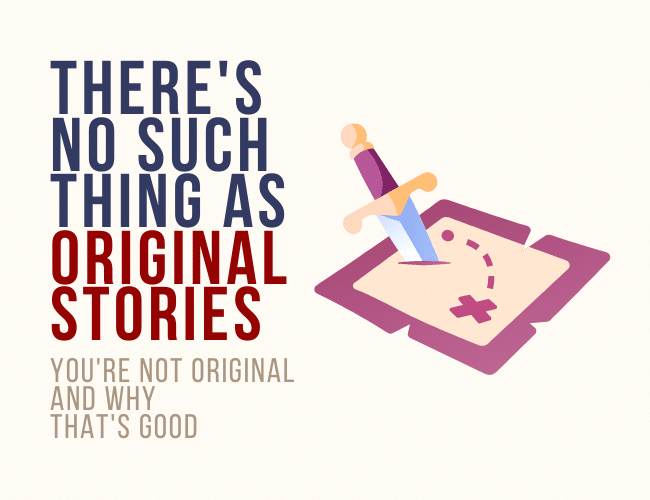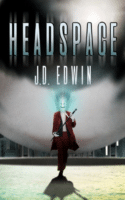Have you ever heard that there are no original stories? Did this turn your stomach or make you angry? You're a writer, after all! Isn't coming up with original stories your goal?

Although the idea that there are no original stories sounds upsetting, especially for writers, the truth is that every story follows the rule (most likely) of “same, but different.”
That's a good thing!
If stories were completely original, it would be hard to know if there was a readership interested in them. We want stories that are unique, but that also follow the same conventions and tropes of certain types of stories that we've read or seen before.
Doing this means that your story will impact your ideal readers, and here's why.
Once Upon a Time, I Believed in Original Stories
I used to think every story is original.
Every story ever told, I thought, must be completely and utterly different. Nothing must repeat, nothing must be the same as anything else. And if I wrote anything that resembled something anyone else has written in history, then I must be an unoriginal hack who will never make it as an author.
But, as it turns out, this couldn’t be further from the truth.
Because the truth is that stories—good stories—function on formulas.
That is not to say that every story follows a formula, but the ones that grow popular or withstand the test of time usually tend to. More than that, the majority of readers don’t want a completely new story. What they actually want is their story they know told in a whole new way.
I didn’t fully and completely embrace this lesson until I wrote my soon-to-be published novel, Headspace.
At its core, Headspace is a story about an ordinary person who enters, or rather is forced into, a competition in an extraordinary setting.
Does that sound familiar? Perhaps because it’s the same formula followed by The Hunger Games, Ready Player One, cult classic Battle Royale, and a number of YA and science fiction novels.
I struggled with this hugely as I put the book on paper, wondering if I am a fraud and copycat for simply coming up with this story. However, it is a story I believed in and it demanded to be written, so I forged ahead.
As I wrote, I realized something important: the more I wrote, the more organic the story became.
It grew its own way and differed greatly from books that follow the same formula.
Though the concept is the same, every one of these books are different, and beloved in their own right. My story, as it turns out, is different as well.
My characters do not follow the path of others in similar situations, and my book does not walk a paved path but rather finds its own. My story may not be original, but it is unique.
More importantly—at least as I like to believe—it’s good.
But what exactly does it mean to be unique if not original? Let’s take a look.
The “Unoriginal” Original
There are a number of studies on plot types and many people differ on exactly how to categorize plot. However, one thing remains the same—experienced writers recognize that the majority of stories fall into a small handful of types.
Rather than go into detailed examples in this article (you can find more of those here), I want to point out some easily recognizable examples to help you recognize that nothing is truly original.
A hero is sent on a journey to complete a quest
A hero has set out on a long journey to complete a quest or obtain a prize that is far away. They meet and join up with unlikely companions who help them along the way or turn out to be enemies.
What story is this?
Perhaps it’s The Lord of the Rings. That’s the obvious answer.
But maybe it’s Indiana Jones?
Or how about Watership Down?
If we want to go back even further, maybe it’s The Odyssey?
Is it possible that every hero on a quest since Odyssey has just been a retelling of the same formula?
Now I see you scratching your head a bit and re-thinking this whole concept of “original.” Let me give you the same idea, but rephrased a bit.
An ordinary hero is sent on an adventure
An ordinary, slightly annoyed guy is dragged onto an unwilling adventure by eccentric acquaintances.
Ok, that’s definitely The Hobbit, right?
Wait, maybe the old favorite, The Hitchhiker’s Guide to the Galaxy?
Or the TV show Sherlock.
It could even be Green Eggs and Ham!
Different Stories, Same Formula as a Good Strategy
Are these stories too similar to be interesting? Or have you found each one unique and enjoyable on its own?
Has it even occurred to you that they share the same core formula?
Here’s an even more blatant example.
Two people meet. Two people fall in love. Two people run into trouble they conquer. Two people live happily ever after.
What does this sound like?
Perhaps every romance novel ever written, plus every story with a romantic subplot?
I don’t see the romance industry shrinking any time soon. In fact, there are more love stories written every year and the people love them just the same.
You can read more about stories that share a common formula in this article about short story ideas.
Old Idea, New Twist: 3 Ways to Make Your Story the Same, But Different
You may now ask, “How do I distinguish myself if every story out there has been told a hundred different times?” Is it even worth writing your story if everyone else out there has already told it?
Yes! Everyone else has told this story, but you haven’t.
How you tell this story will be different from everyone else, see? The world needs the version you want to tell, too.
Here are three easy ways to make an old formula into a new story.
1. Fresh Perspective
A story told from a different perspective becomes a new story entirely. This means a new POV, we want to hear from your narrators in a fresh way!
Every set of eyes in a story looks at its events differently.
For example, a superhero story told from the point of view of the sidekick is completely different from the hero’s point of view.
A love story seen from the eyes of the rival love interest is a new story entirely.
Take a traditional story and tell it from someone you wouldn’t expect to hear from, and suddenly you have a tale never told before.
2. Unexpected Twist
When reading a book with a proven formula, readers tend to expect a certain order of events:
- Cinderella marries the prince
- The quest for the holy grail ends in obtaining the treasure
- The case is solved and the murderer found
- Etc.
However, if you change just one of the expected elements, it turns the story on its head.
Perhaps Cinderella never wanted the prince to begin with. Maybe instead she’s conspiring with her sisters to burgle the palace.
Maybe the murderer everyone thought was guilty was actually innocent and it was the detective who set up the whole thing.
Have you ever considered that treasure at the end of the journey isn’t a treasure at all, but a curse that must be given to someone and the unwitting hero has now become a sacrifice?
3. Combine Formulas
When you find it difficult to find uniqueness within one formula, sometimes it’s best to take a few and combine! No one said you have to stick to one.
The best way to approach this is to select one formula and add elements of others, otherwise your story could feel unfocused.
A comedy with a few touching tragic scenes, for example, or an adventure story that also leads to the protagonist discovering something unexpected about themselves can easily lead to a more complex and unique story.
Whatever you combine, it will be a unique way you tell the same story. It will be your own original unoriginal way of telling it.
The World Is Full of Unoriginal Stories (Yipee!)
Don’t confuse “original” with good. And even more so, don’t confuse “unoriginal” with bad.
You do not have to be original to be unique.
There is someone out there waiting to hear your version of an age-old story, that only you can tell. It’s important to recognize that formulas work for a reason and once you learn them, you can use them in a way that is completely and utterly, you.
And if you're stuck, if you're afraid that your story is too similar, turn to your writing community for some honest feedback.
Beta readers and editors can help you identify what is the difference between copycat and the same flavor with a twist. The rest is all in the details.
 Want to read a brand-new original unoriginal story? My novel Headspace will be published in July 2021, but you can read it now for free when you join my launch team! Send an email to admin@thewritepractice.com to let me know you're in. I can't wait to see what you think!
Want to read a brand-new original unoriginal story? My novel Headspace will be published in July 2021, but you can read it now for free when you join my launch team! Send an email to admin@thewritepractice.com to let me know you're in. I can't wait to see what you think!
What are some story ideas you thought were original stories? Can you think of others like them? Let us know in the comments.
PRACTICE
Now that you know there is no such thing as original stories, work on creating a unique story idea that is like another story that you love.
First, think of one of your favorite stories. What's the premise? Write it in one or two sentences. If you're stuck, try a classic fairytale: Cinderella.
Next, take that premise and give it a twist of your own. Pick one of the three ways to make your story unique and apply it to this story idea.
Now, write it! For fifteen minutes, try writing your own story idea using one of these three suggestions. Start with writing a new one- or two-sentence premise of your own, and when you've finished, write a scene from your new story.
When you're done, share your original unoriginal story in the comments below, and be sure to leave feedback for three other writers!
J. D. Edwin is a daydreamer and writer of fiction both long and short, usually in soft sci-fi or urban fantasy. Sign up for her newsletter for free articles on the writer life and updates on her novel, find her on Facebook and Twitter (@JDEdwinAuthor), or read one of her many short stories on Short Fiction Break literary magazine.




0 Comments